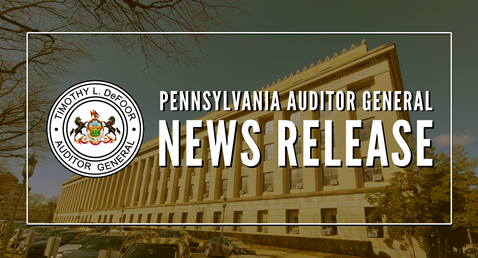Auditor General DePasquale Urges End to Spending on Lottery Privatization, Calls for Legislature or Governor to Act by Dec. 31
Contract Review Shows Costs Ballooned from $725,000 to $4.6 Million Without End in Sight
Auditor General DePasquale Urges End to Spending
on Lottery Privatization,
Calls for Legislature or Governor to Act by Dec. 31
Contract Review Shows Costs Ballooned from $725,000 to $4.6 Million Without End in Sight
HARRISBURG (Dec. 12, 2013)– Auditor General Eugene DePasquale today urged the Governor or the General Assembly to take action by the end of this year to resolve Pennsylvania Lottery management privatization contract negotiations with British-owned Camelot Global Services Inc. The privatization initiative will cost taxpayers an estimated $4.6 million, or more than 11 percent of the Lottery’s annual operating budget.
“Enough already,” DePasquale said. “The commonwealth has spent millions on this lottery privatization effort and that number will continue to grow if this contract is not resolved – one way or another – by Dec. 31 when the agreement with Camelot Global Services Inc. expires.
“By the end of this year, Governor Corbett should either resubmit this contract to the Attorney General or drop the whole idea; or, the General Assembly should put the Lottery privatization issue up for a vote. We must move on and stop wasting money that is intended to provide programs for seniors.”
DePasquale said his review of the contract reimbursements shows that costs for privatization consultants soared from the original $725,000 for three consultants to an estimated $4.6 million. The review followed the Corbett administration’s decision in late October to provide yet another extension on the contract he wants to award to Camelot Global Services Inc. The state attorney general rejected an initial contract in February 2013.
To assist with the privatization effort, the commonwealth hired DLA Piper, an international law firm headquartered in Chicago; Blank Rome, a law firm in Philadelphia; and Greenhill and Co., a financial advisory firm with offices in New York and Chicago; to provide services connected to the lottery privatization.
To date, the commonwealth paid $2.36 million to DLA Piper; $1 million to Greenhill and Co.; and $123,000 to Blank Rome for a total of $3.48 million. An additional $1.1 million is authorized through Dec. 31, 2013 under various addendums to the original contracts.
The original contracts called for payments of $375,000 to DLA Piper; $200,000 to Blank Rome; and $150,000 to Greenhill for a total of $725,000.
“The Lottery funds paid to DLA Piper are of concern since the firm claims to have experience in lottery privatization but was unable to develop a contract that could gain legal approval of the Pennsylvania attorney general,” DePasquale said. “So far, all we know of DLA Piper’s work is that they failed to do what the administration is paying them more than $2 million to do. Taxpayers have a right to know the rationale behind hiring this firm and to see some results for these exorbitant costs. That has not happened.”
The auditor general noted DLA Piper developed the management agreement used to privatize the Illinois Lottery. The firm hired to manage that state’s lottery, has fallen short on revenue guarantees every year in the management agreement.
“Looking at the problems with the lottery privatization experiment in Illinois and the legal expertise hired here makes me wonder how senior programs will fair if we continue to spend money on these advisory services,” DePasquale said.
The auditor general noted that his department’s scrutiny of invoices and receipts for these firms revealed that the majority of the total expenses paid to date were for hourly labor costs at $2.4 million. The balance of the payments were reimbursements for professional services of $1 million to Greenhill and Co. and approximately $50,000 for lodging, food, airfare, parking, and mileage costs for DLA Piper.
“Our review found that the reimbursement charges in the $3.48 million paid so far are rather typical for doing business deals of this type,” DePasquale said. “But, we need to stop bleeding money from senior programs to explore privatizing management of the lottery when current administrative overhead costs for the state to run the lottery are only two percent of sales. If every government-run program were that efficient we wouldn’t have budget problems.
“While some might say that the money allocated for these firms is a small portion of the Lottery’s net revenue of $1 billion per year, the flip side from my standpoint is that this money could have been better spent to benefit thousands of older Pennsylvanians.”
# # #
